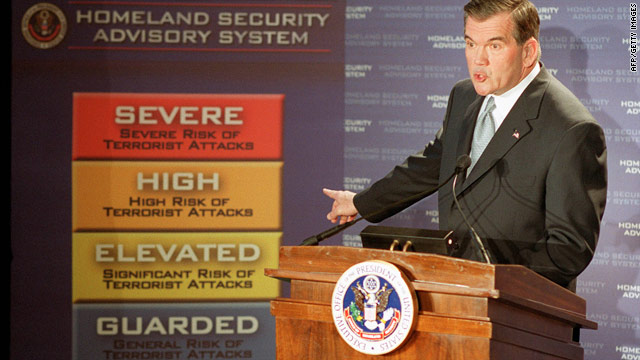In 12 days it will be the 10 year anniversary of the terrorist attacks on the World Trade Centre and the Pentagon. I will continue to highlight those events of 2001.
February 12, 2002
Testifying before the Senate Budget Committee, Secretary of State Colin Powell states: "With respect to Iraq, it's long been, for several years now, a policy of the United States' government that regime change would be in the best interest of the region, the best interest of the Iraqi people. And we're looking at a variety of options that would bring that about."

May 20-24, 2002
The Bush administration issues an unprecedented series of terror warnings. Vice President Cheney warns it is "not a matter of if, but when" al Qaeda will next attack the U.S., a warning repeated by Homeland Security Director Tom Ridge. Defense Secretary Donald Rumsfeld says that terrorists will "inevitably" obtain weapons of mass destruction, and FBI Director Mueller says more suicide bombings are "inevitable." Authorities also issue separate warnings that al Qaeda terrorists might target apartment buildings nationwide, banks, rail and transit systems, the Statue of Liberty, and the Brooklyn Bridge.

July 30, 2002
Richard Butler, a former U.N. weapons inspector from Australia, tells the Senate Foreign Relations Committee, "I have seen no evidence of Iraq providing weapons of mass destruction to non-Iraqi terrorist groups."

August 20, 2002
Secretary of Defense Donald Rumsfeld, citing various "intelligence reports," claims that the Iraqi government is "hosting, supporting or sponsoring" an al-Qaeda presence in Iraq. And in an interview with Fox News, he rejects calls for the administration to disclose its evidence that Iraq has weapons of mass destruction. "Think of the prelude to World War II. Think of all the countries that said, well, we don't have enough evidence," he says. "I mean, Mein Kampf had been written. Hitler had indicated what he intended to do. The people who argued for waiting for more evidence have to ask themselves how they are going to feel at that point where another event occurs."

February 12, 2002
Testifying before the Senate Budget Committee, Secretary of State Colin Powell states: "With respect to Iraq, it's long been, for several years now, a policy of the United States' government that regime change would be in the best interest of the region, the best interest of the Iraqi people. And we're looking at a variety of options that would bring that about."

May 20-24, 2002
The Bush administration issues an unprecedented series of terror warnings. Vice President Cheney warns it is "not a matter of if, but when" al Qaeda will next attack the U.S., a warning repeated by Homeland Security Director Tom Ridge. Defense Secretary Donald Rumsfeld says that terrorists will "inevitably" obtain weapons of mass destruction, and FBI Director Mueller says more suicide bombings are "inevitable." Authorities also issue separate warnings that al Qaeda terrorists might target apartment buildings nationwide, banks, rail and transit systems, the Statue of Liberty, and the Brooklyn Bridge.

July 30, 2002
Richard Butler, a former U.N. weapons inspector from Australia, tells the Senate Foreign Relations Committee, "I have seen no evidence of Iraq providing weapons of mass destruction to non-Iraqi terrorist groups."

August 20, 2002
Secretary of Defense Donald Rumsfeld, citing various "intelligence reports," claims that the Iraqi government is "hosting, supporting or sponsoring" an al-Qaeda presence in Iraq. And in an interview with Fox News, he rejects calls for the administration to disclose its evidence that Iraq has weapons of mass destruction. "Think of the prelude to World War II. Think of all the countries that said, well, we don't have enough evidence," he says. "I mean, Mein Kampf had been written. Hitler had indicated what he intended to do. The people who argued for waiting for more evidence have to ask themselves how they are going to feel at that point where another event occurs."

No comments:
Post a Comment